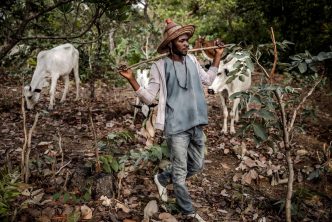Image Credit: Guardian.ng
An understanding of individuals or groups’ responses to circumstances can only be more evident when there are explorations on actions. With that, we can understand their invisible but constant and quiet norms, symbols, and values, which provide them
with the lenses for viewing their reality.
These philosophies constitute parts of the cultural filters through which they create meaning from situations and respond to them. These cultural filters’ role is yet to be given adequate attention in the solutions applied so far to the farmer-herder conflicts in Nigeria.
The current approaches to the problem are mostly the use of laws and policies like the anti-open grazing law in Benue State and the National Livestock Transformation
Plan (NLTP). Also is the use of law enforcement such as military and police operations. In a few instances, civil society interventions have experimented on dialogue, mediation, and strengthening intercultural understanding, though this has yet to gain traction.
Centrally, agrarian tensions and conflicts are continuing because discussions and intercultural relations that lead to mutual understanding, address the fears and expectations of disputing groups, and build peace on mutually agreed terms are yet to be well implored.







